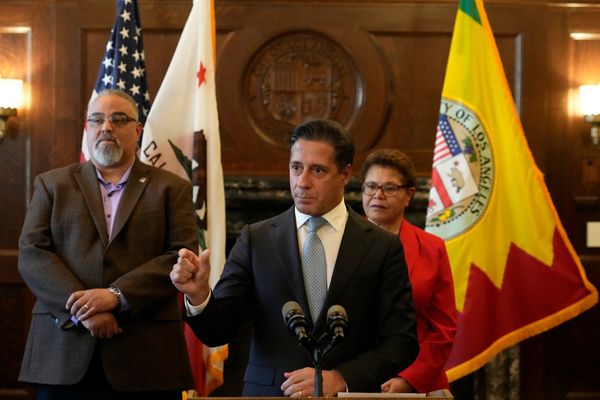BALTIMORE — An opinion issued this week in the appeal of the family of Hae Min Lee from the notorious case of the man long held responsible for her killing, Adnan Syed, has touched off a debate in Maryland about crime victim rights.
State law says crime victims or people representing them should be treated with “dignity, respect, and sensitivity during all phases of the criminal justice process,” and the Appellate Court of Maryland said that didn’t happen last September, when Lee’s brother, Young Lee, got short notice of a hearing that terminated Syed’s murder conviction and was able to attend that proceeding not in person but by video call.
However, the same appeals judges who found Young Lee’s rights were violated acknowledged that Circuit Judge Melissa Phinn went above and beyond by allowing him the opportunity to address the court that day — the law does not expressly give victims the right to speak at hearings to vacate court judgments.
To remedy the injustice they say Young Lee experienced, the judges, in a split decision, voted to reinstate his convictions, undoing Baltimore prosecutors’ decision to dismiss Syed’s charges, and mandate a do-over of the Sept. 19 hearing that set Syed free. The only thing that has to happen differently the second time around, according to the ruling, is Young Lee being given enough notice to attend in person.
Syed plans to appeal to the Supreme Court of Maryland, and legal experts widely expect the state’s highest court to take the case. But if the high court upholds the appellate court’s decision, Syed will find himself again a convicted murderer serving life in prison and facing the uncertainty of a different Baltimore state’s attorney handling his case.
The appellate decision that scholars are calling “unprecedented” has a legal community divided on its merits and implications: Is this ruling a dramatic step toward altering the criminal justice system to give victims the right to influence legal decisions? Or is it simply a recognition of the rights the state already affords crime victims?
“For an appellate court to take the step of effectively re-imposing a murder conviction and a life sentence because of a procedural disagreement over whether Zoom is a sufficient means of participation in a court proceeding, which we now have all adjusted to, is simply extraordinary and far reaching,” said Baltimore defense attorney David Walsh-Little.
“Mr. Syed,” he continued, “has made claims of innocence, and the prosecuting body and the trial court concluded that at a minimum, serious doubts exist concerning the integrity of the evidence. This decision shockingly undervalues the many people who have been wrongfully convicted of crimes and are seeking redress by the same or similar legal avenues as Mr. Syed.”
Howard County State’s Attorney Rich Gibson, president of the Maryland State’s Attorneys’ Association, disagrees, arguing the ruling is “consistent with the law.”
“A victim’s family who’s actually lost someone deserves adequate time for the option to be (physically) present,” Gibson said. “They lost a loved one — someone’s not here. That has to have weight.”
Made famous by the podcast “Serial,” Syed’s case dates to 1999.
In February of that year, the body of 18-year-old Hae Min Lee was discovered in Baltimore’s Leakin Park. She had been strangled to death, and police soon focused the investigation on Lee’s ex-boyfriend, Syed, then 17. At trial, the state posited the theory that Syed, a popular honors student, killed her because he couldn’t handle the breakup.
After a jury convicted him of murder in 2000, a judge gave him life in prison. He remained behind bars as courts rejected his repeated appeals.
Syed’s fortune appeared to turn in 2021, when his lawyer approached the Baltimore state’s attorney’s office with hopes of having his punishment reduced because of a new law allowing sentence modification for people convicted in their youth. While reviewing his case, the office said, prosecutors began to have concerns about the case and launched a reinvestigation.
They moved to throw out his conviction in September, citing two people they now considered suspects in the homicide and whom they said Syed’s defense lawyers should’ve been told about decades ago. After 23 years of incarceration, Syed walked free when Phinn vacated his conviction.
The prosecutor, Becky Feldman, and Syed’s defense attorney, Erica Suter, apparently met with Phinn in her chambers Sept. 16, a Friday, and scheduled the hearing for the following Monday, Sept. 19. Feldman emailed Young Lee after meeting with Phinn, informing him of the court date and explaining she arranged for him to watch by Zoom.
An attorney for the Lee family appeared in court that Monday asking for a seven-day postponement. Phinn denied it, but allowed Young Lee to express his thoughts about the development over video. He said he felt betrayed by prosecutors.
After Syed’s conviction was overturned, Young Lee’s lawyer said he was going to appeal. Three days later, then-State’s Attorney Marilyn Mosby dismissed Syed’s charges.
The court entertained the appeal anyway. What began as a challenge to the amount of notice Young Lee received soon questioned the evidence used to free Syed and described his release as predetermined.
Appellate judges Kathryn G. Graeff and E. Gregory Wells denied Young Lee’s request to call witnesses and challenge evidence at the vacatur hearing, but wrote in their opinion they “share many of Mr. Lee’s concerns about how the proceedings were conducted.” They ordered a “transparent hearing on the motion to vacate, where ... evidence supporting the motion to vacate is presented, and the court states its reasons in support of its decision.”
Douglas Colbert, a professor at the University of Maryland Francis King Carey School of Law who represented Syed at a bail review decades ago, and several defense attorneys interviewed expressed concerns that the appellate court’s ruling would pave the way for victims to intervene in legal questions, which could lead to rulings swayed by emotion, they said.
It would be “a radical transformation of Maryland law. It’s putting the victims lobby as the principal party,” Colbert said. “You can’t begin the court proceedings without making sure the representative or the victim is present and now speaks — not just to give a crime impact statement — but to question a prosecutor who, after a full investigation, follows Maryland law and asks for the case to be dismissed ... it’s not the way our constitutional system works.”
“The court did not go that far in this opinion” he added, “but the road that they’re traveling is precarious. It’s a dangerous path.”
Kurt Wolfgang, executive director of the Maryland Crime Victims Resource Center, said he has heard similar concerns every time his organization has successfully lobbied the legislature to advance victims rights.
“Really what the court did, I think, was recognize that crime victims’ rights are constitutional rights in Maryland. They’re not just inconveniences and obstacles that can be stepped over by the litigants involved,” Wolfgang said, adding later, “We would have liked them to have recognized the victims’ rights to participate further. I understand essentially their ruling puts it back onto the legislature.”
The General Assembly, or the judiciary’s Standing Committee on Rules of Practice and Procedure, is where the authority to clarify victims rights law belongs, appeals court Judge Stuart R. Berger wrote in his dissenting opinion.
Berger said he believed Young Lee appearing by video satisfied his right to attend the proceeding, while the other judges — the majority — said it was unfair to ask Young Lee to appear by video when the attorneys, judge and Syed were present in court.
“The court is speaking out of both sides of its mouth,” defense attorney Donald Wright said, noting that courts across the state host bail reviews where the defendant appears on video from jail, as well as more consequential proceedings like plea and sentencing hearings. “Why should that be any different than something like this?”
A 40-year veteran of criminal law, defense attorney Warren Brown said the system could stand to show more compassion to crime victims. Even Brown, who lost his stepson to gun violence in Baltimore, said he has become numb to the pain of victims as a preservation method to continue his work.
But he, too, has concerns about what could happen to Syed if the administration of State’s Attorney Ivan Bates, who has not addressed the case in office but expressed support for Syed’s freedom on the campaign trail, decides to handle the case differently in circuit court.
“We would be back in that position ... where this guy is snatched off the streets, put back to serve a life sentence in prison, all because the victim’s family didn’t get to speak at a proceeding that their feelings by law have no impact on the court’s decision,” Brown said. “That would be crazy.”
———
(Baltimore Sun reporter Lee O. Sanderlin contributed to this article.)
———







